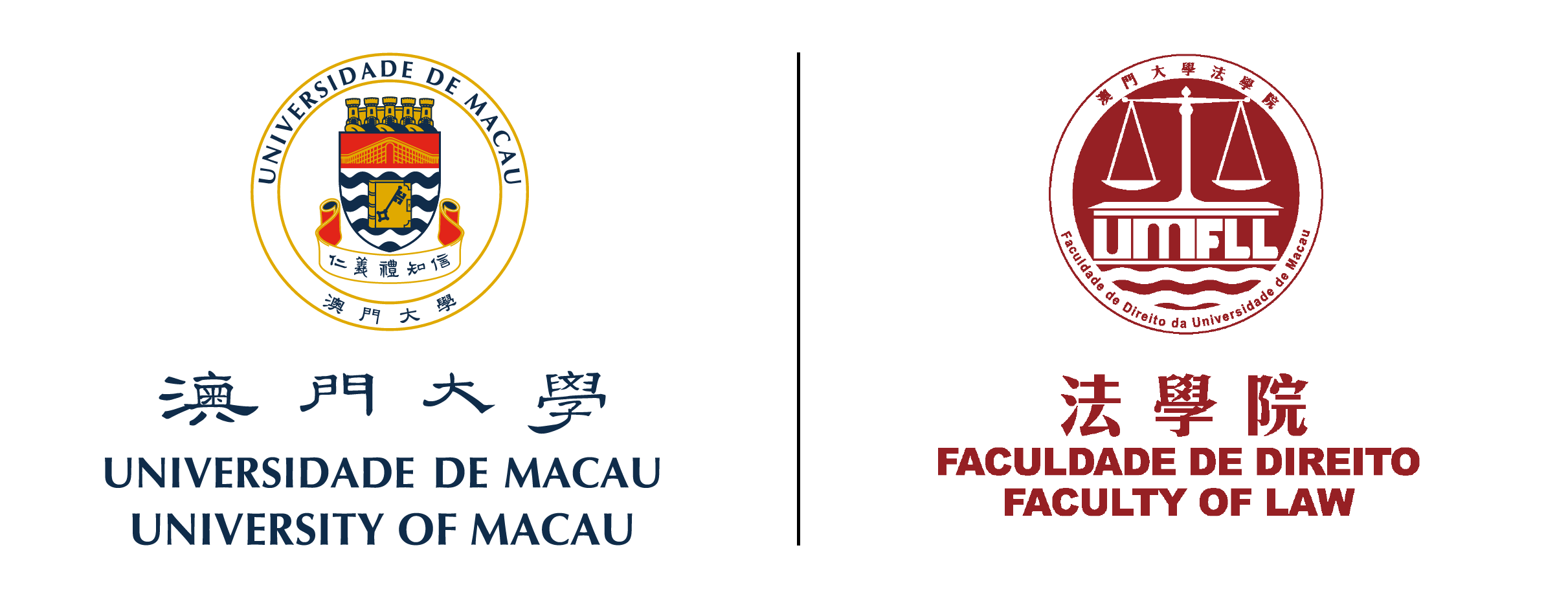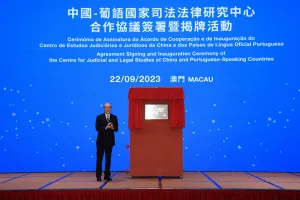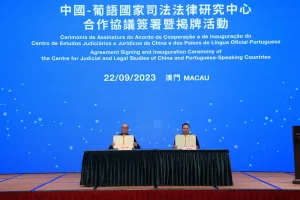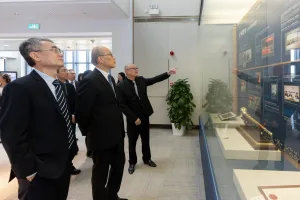The University of Macau (UM) and the Supreme People’s Court of the People’s Republic of China today (22 September) held the agreement signing and inauguration ceremony for the Centre for Judicial and Legal Studies of China and Portuguese-Speaking Countries jointly established by both parties. The two parties also exchanged views on the current status and prospects of judicial exchanges between China and Portuguese-speaking countries, as well as on judicial and legal exchanges and cooperation between mainland China and Macao, with a view to strengthening cooperation.
Guests attending the event included Zhang Jun, president and chief justice of the Supreme People’s Court; Deng Xiuming, vice-president (daily operation) of the Supreme People’s Court; Cheong Weng Chon, secretary for administration and justice of the Macao SAR; Yang Wanming, vice-president of the Supreme People’s Court; and Zhang Haibo, president of the High People’s Court of Guangdong Province. Yonghua Song, rector of UM, said in his speech that in the context of the Belt and Road Initiative, China’s close ties with Portuguese-speaking countries have resulted in increased demand for judicial cooperation between the two sides. The establishment of the centre is timely, providing a platform for cooperation and exchanges between different judicial systems. It is also an important outcome of the friendly exchanges and close cooperation between China and Portuguese-speaking countries. The centre not only provides a new platform for interaction but also embodies the new direction of international exchanges and cooperation in the new era. It will provide more comprehensive, equitable, and transparent judicial services for economic prosperity and the building of a common destiny for mankind, thereby facilitating the advancement of judicial work of all parties and the civilisation of the rule of law across the globe.
Duan Nonggen, director of the Research Office of the Supreme People’s Court, and Tong Io Cheng, dean of UM’s Faculty of Law, signed a cooperation agreement on behalf of the two parties. They hope to take the signing of the cooperation agreement as an opportunity to foster deeper, broader, and higher-level cooperation, and to give full play of their respective strengths and yield fruitful outcomes.
The inauguration ceremony was officiated by Zhang Jun, marking a new journey of high-quality development for the Centre for Judicial and Legal Studies of China and Portuguese-Speaking Countries. The centre is jointly established by the Supreme People’s Court and UM, with the Research Office and the Bureau of International Cooperation of the Supreme People’s Court providing guidance on its development direction and strategy, and the Faculty of Law of UM in charge of its daily operations. The centre’s current main tasks include the research and promotion of Xi Jinping’s Thought on the Rule of Law, conducting legal research on China and Portuguese-speaking countries, cultivating international and multi-disciplinary legal talent, facilitating cooperation in the ascertainment of foreign law, and creating databases of Chinese and Portuguese laws, cases, and legal information.
After the inauguration ceremony, the two parties had discussions on the future development of the centre, as well as on judicial and legal cooperation and exchanges between mainland China and Macao. Rector Yonghua Song presided over a seminar on the establishment and research of the centre, during which Prof Tong Io Cheng discussed the centre’s establishment and presented its annual work plan. Paulo Jorge Rodrigues do Espírito Santo, deputy secretary-general of the Permanent Secretariat of the Forum for Economic and Trade Cooperation between China and Portuguese-speaking Countries (Macao), addressed the economic and trade relations and cultural differences between China and Portuguese-speaking countries, and highlighted the benefits that legal exchanges and cooperation can bring to both sides. The two parties also discussed the judicial and legal exchanges between the two jurisdictions, with Cheong Weng Chon and Yang Wanming presenting the relevant information.
Zhang Jun said in his concluding remarks that the establishment of the centre is an important initiative for the Supreme People’s Court and the Macao SAR to thoroughly implement the important remarks made by General Secretary Xi Jinping on Hong Kong and Macao affairs, to contribute to the development of the Guangdong-Hong Kong-Macao Greater Bay Area, and to help Macao play the role of a bridge between China and Portuguese-speaking countries. He also expressed hope that the centre will focus on promoting the legal regulatory interface in Guangdong and Macao and continue to implement the ‘One Country, Two Systems’ policy, so as to give new impetus to Macao’s long-term prosperity and stability and provide strong support for the high-level opening-up of the country.
In addition, the delegation from the Supreme People’s Court visited UM, accompanied by Cheong Weng Chon and members of UM’s Faculty of Law. During the visit, UM representatives presented the history and development of the university.




